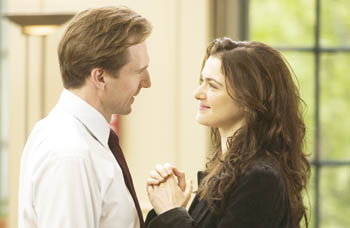![[Metroactive Movies]](/movies/gifs/movies468.gif)
[ Movies Index | Show Times | Silicon Valley | Metroactive Home | Archives ]

Photograph by Jaap Buitendijk Another Fiennes Mess: Ralph Fiennes and Rachel Weisz struggle against a multinational drug company in 'The Constant Gardener.' Drugs and Corruption A death in Kenya exposes corporate greed in Fernando Meirelles' adaptation of John Le Carre's 'The Constant Gardener' ACCORDING TO George Orwell, the British Empire was "a ring of bayonets protecting a shopkeeper." In John Le Carre's The Constant Gardener, what's left of the Empire in Kenya is a ring of filing cabinets around some 30,000 expatriate English. The British who remain are entrepreneurs who excuse their money-making schemes in a starved kleptocracy with double talk: "We have to be rich before we can help the poor." Fernando Meirelles' film version of the novel is a triumph of the cerebral thriller—a splendid matching of a political lesson with the novelist's expertise in charting paranoia and betrayal. Meirelles' previous effort, City of God, was a whirling movie. It drilled itself so deep into the world of gangsters that it began to accept their every self-justification. The Constant Gardener displays much more stature. In this sort-of sequel to The Third Man, it is as if that old hand in the diluted penicillin racket, Harry Lime, has been promoted to CEO of a major pharmaceutical company. Tessa (Rachel Weisz) is found bushwhacked in a burned Land Rover. Her apparent lover, a Kenyan doctor and the prime suspect in her murder, is missing. Tessa is survived by her husband, Justin Quayle (Ralph Fiennes), a middle-aged nullity—a member of "the East African Donor's Effectiveness Committee"—and that's just as impotent as it sounds. (The film's title refers to Quayle's one salient feature: he's good with plants, if a nothing else.) Even before her final tragedy, Tessa was an embarrassment: a do-gooder who spent too much time trying to help the natives in the Nairobi slum township of Kibera. Investigating his wife's murder, Justin begins to believe that the intelligence-gatherers around him know more than they're saying. Among those holding out: his superior, Pellegrin (a magnificent portrayal of overbred swinishness by Bill Nighy), and Justin's closest social acquaintance, Sandy (America's fastest-rotting actor, Danny Huston). Gradually, Justin unearths the scandal his wife was trying to investigate: a multinational company is treating the continentwide AIDS epidemic with suspicious medicine: "disposable drugs for disposable people." Le Carre has complained that seeing film adaptations of his novels is like seeing his oxen made into bouillon cubes. Yet Jeffrey Caine's script is more like an expert filleting than a boiling down. Meirelles shoots on the run with hand-held cameras and rack-focusing. He induces an orchestrated confusion that is the opposite of Le Carre's chess-player's concentration. Meirelles and Caine's avant-garde approach complements the sturdy material. Too often, white filmmakers survey Africa like landscape artists. (John Boorman's flop In My Country is an example; so is Out of Africa.) Meirelles conveys the chaos of a teeming ghetto without making the humans look like bugs. If he surveys the sweetness of the smiling children, he also glances into the open-air sewers. Still, the film isn't benumbed by hopelessness. Both Meirelles and Le Carre share the honest novelist's faith that the exposure of a problem is the beginning of a solution. The cast won't quit. Fiennes fits the scenario of betrayal like a turkey fits an ax; his wincing, quavery eyes speak of indigestion, as if the silver spoon in his mouth had suddenly turned bitter. When he takes up counterespionage against the omniscient "Three Bees" corporation, his fragility winches up the tension. The ripe-lipped Weisz evokes the appropriate air of privilege and bad nerves as a countess' daughter with the fatal avocation of doing good where everything has gone bad. Seeing the two in the childlike love scenes, it's as if the marriage was doomed from first sight. The Constant Gardener is not a movie you can sink into. It's the kind you watch trying not to breathe, for fear of missing a detail. True, the hand-held camera is bad for the easily seasick. And the finale in a Sudanese refugee camp, a finale of shouting men and gunshots, seems like a knockoff of Indiana Jones. Everything previous had wrung suspense from smaller details: purloined letters, smooth-faced political lies and the ambient cynicism of those who squeeze Africa like a used tea bag. Watching The Constant Gardener, I had the sense that I was seeing the first 21st-century political thriller. Meirelles is a prodigious filmmaker, although sometimes florid (he gives us the imagery of a soul leaving a body as represented by the flight aloft of startled pink flamingos). What chills the most is the suggestion of no safety even in England, where the eyes of security cameras watch everything. Movies are the last place where we allow ourselves to succumb to the old colonial fiction: that some cool, soft-spoken man in London will fix everything.
The Constant Gardener (R; 128 min.), directed by Fernando Meirelles, written by Jeffrey Caine, based on the novel by John Le Carre, photographed by Cesar Charlone and starring Ralph Fiennes and Rachel Weisz, plays valleywide.
Send a letter to the editor about this story to letters@metronews.com. [ Silicon Valley | Metroactive Home | Archives ]
|
From the August 31-September 6, 2005 issue of Metro, Silicon Valley's Weekly Newspaper.
Copyright © 2005 Metro Publishing Inc. Metroactive is affiliated with the Boulevards Network.
For more information about the San Jose/Silicon Valley area, visit sanjose.com.